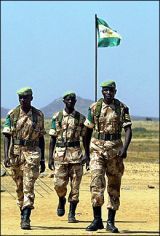AU may need to quadruple troops to restore order in Darfur
By ANTHONY MITCHELL
ADDIS ABABA, Ethiopia, Apr 27, 2005 (AP) — The African Union may need to quadruple its peacekeeping force in Sudan’s western region of Darfur to 12,300 to restore order in the troubled region, according to an internal assessment.

|
|
Rwandan troops operating under the Africa Union mandate walk inside the AU base in Kab Kabiya, Sudan. (AFP). |
The assessment, obtained by The Associated Press Wednesday, was to be presented to the African Union Peace and Security Council when it meets Thursday in Addis Ababa to discuss the situation in Darfur.
The African Union force now in Darfur is “extremely stretched” and cannot fulfill its mandate, said the assessment done in March by African Union staff based in the Sudanese capital, Khartoum, and from the organization’s headquarters in the Ethiopian capital.
The report said that troop numbers must initially be increased to 5,887, in addition to 1,560 civilian police, by August, before considering a much larger deployment.
If the Sudanese government “remains unable to provide appropriate levels of security to support the return of internally displaced persons and the delivery of humanitarian assistance in all parts of Darfur, consideration has been given to … (increase the force) to approximately 12,300,” the report said.
The African Union has 2,200 troops in Darfur out of an initial proposal of 3,320. The organization has not received the funding it needs for the 3,320.
“Militarily, the force should be in a position to promote a secure environment across Darfur,” the report said.
In Brussels, NATO allies agreed Wednesday to consider providing logistical help to the AU’s force in Darfur. The agreement followed a written request from the chairman of the AU Commission, Alpha Oumar Konare, said NATO spokesman James Appathurai.
NATO officials said that the support would not entail the deployment of an alliance force in Sudan. However, Appathurai said it “would be the most significant focus by NATO on an African security problem.”
Talks with the AU on a NATO role are expected to start “very, very quickly” Appathurai said.
The Darfur conflict surged in February 2003 after rebels of ethnic African tribes took up arms, complaining of discrimination by the Arab-dominated government in Khartoum. The government is accused of responding by backing a scorched-earth counterinsurgency by pro-government Arab militias.
War-induced hunger and disease has killed more than 180,000 people, according to U.N. estimates. At least 2 million have been made homeless by the conflict. No firm estimates of the number killed in fighting exists.
U.N. Secretary-General Kofi Annan has said it is possible that U.N. peacekeepers could complement AU troops in Darfur. His special envoy to Sudan, Jan Pronk, has said 8,000 troops are needed for Darfur.
In proposing even more than the 8,000 U.N. figure, the AU assessors proposed an expansion in phases.
By May, according to the assessment report, the AU force should be at the authorized strength of 3,320, an operation that will cost US$220 million (A?169.48 million) a year. The second phase will take the numbers of peacekeepers up to 7,447 by August.
Only then should the AU look to further increase its mission size to 12,300 military, police and civilian personnel, said the report.
“The aim of the third phase, which might be viewed as a follow-on mission in view of the fact that it takes the operation to an entirely new plane, is to contribute to a secure environment throughout Darfur in order to enable full return of displaced persons,” said the report.
It said that a “robust police presence” would be required when families who fled their homes began to return.
